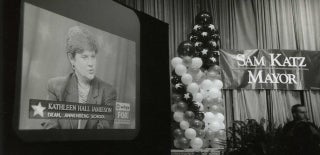
The Jamieson Years (1989-2003)
Under Dean Jamieson's leadership, a gift from the Annenberg Foundation secured a strong financial future for the school, which also gained renown for its expertise in political communication.
Under the leadership of Dean Kathleen Hall Jamieson (1989-2003) the Annenberg Foundation established the School’s core and supporting endowments, providing the financial resources necessary to secure the School’s long-term stability and allowing the faculty to grow to a group of 16.
Faculty hired during this period, many of whom remain connected to the school today, include Joseph N. Cappella; Martin Fishbein; John B. Jemmott, III; Elihu Katz; Deborah Linebarger; Vincent Price; Katherine Sender; and Barbie Zelizer. Jamieson also helped recruit Diana Mutz to the Political Science department, with a secondary appointment at Annenberg.
In 1990, the name of the school was changed to the Annenberg School for Communication — removing the “s” on the end — to better reflect its focus on the academic discipline of Communication.
Under Jamieson’s leadership, the School developed a specialty in political communication, both at the graduate and undergraduate levels, greatly enhanced by Jamieson’s own research in political communication and rhetoric. The addition of instructors like historian David Eisenhower and journalist Al Hunt also brought political communication expertise to the undergraduate program, which had grown to reach approximately 200 majors -- the level it maintains today.
Elihu Katz helped to initiate the school's first postdoctoral fellowship in the early 1990s, and the school has hosted numerous postdocs ever since.
In 1993, a $120 million grant from the Annenberg Foundation added to the school’s endowment and created a $20 million endowment to establish the Annenberg Public Policy Center (APPC), which was founded as part of the Annenberg School, and create a community of scholars within the University of Pennsylvania that would address public policy issues at the local, state, and federal levels.
Dean Jamieson, who has been the director of APPC since its inception, also secured the site and the funding for a new Annenberg Public Policy Center building at 202 N. 36th Street. The building, designed by the architecture firm Maki and Associates, opened in 2009.
In the mid 1990s, a new expansion to the School building was completed, adding a fourth and fifth floor. Work also began on renovations to the Annenberg Plaza and the underground classrooms (108-111) beneath it.
The National Annenberg Election Survey was launched by APPC in 2000 to examine a wide range of political attitudes about candidates, issues, and the traits Americans want in a president. It continued during the 2004 and 2008 presidential election cycles.
In 2000, the Annenberg faculty made several significant revisions to the graduate program, including suspending the Master’s degree program and moving to the direct admission of students into the Ph.D. program.
Back: The Gerbner Years NEXT: THE DELLI CARPINI YEARS
The Jamieson Years
Photos of the Annenberg School from 1989 until 2003.








